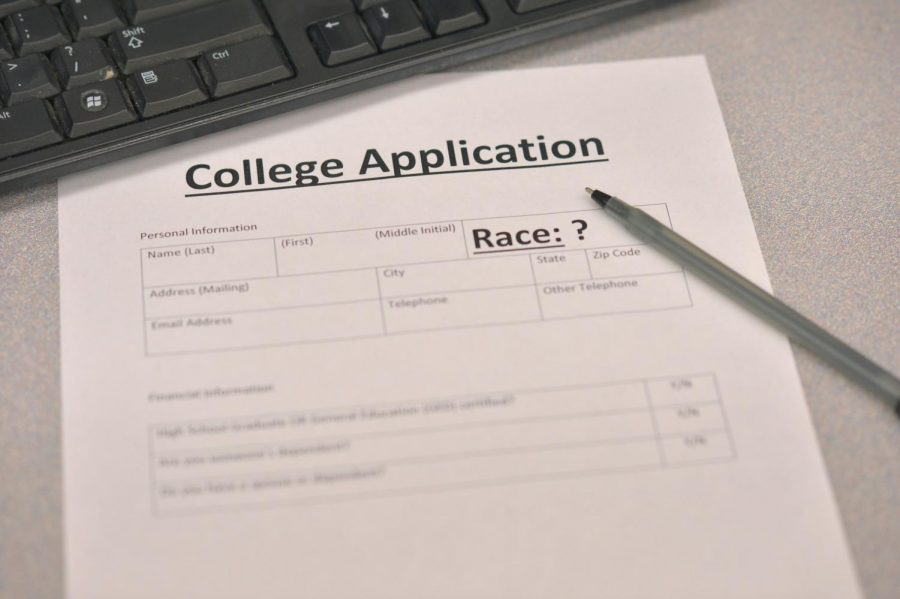Discrimination in the name of diversity
More states should ban affirmative action because it favors certain groups despite claiming not to
RYAN PUGH | EVERGREEN PHOTO ILLUSTRATION
Race is only allowed to be factored into college applications in 42 states. The other eight have banned all or some aspects of affirmative action like strict quotas and preferential treatment in favor of policies that don’t consider racial backgrounds.
August 21, 2018
Take a minute and think about what you would say if I said that because slavery is no longer legal, racism doesn’t exist in America. Many college students would respond with something along the lines of, “The discrimination of the past still echoes today.”
That’s a difficult claim to refute, especially when professors and journalists work hard to deliver awareness of the so-called white privilege. Universities, the trailblazers for social justice, must always keep this privilege in mind, especially in admissions.
Today, the way that universities deal with this privilege is through affirmative action — a method designed to create a diverse campus by using race and background as an admission factor. In other words, it’s a way of fighting racism through racial discrimination.
Before you call me a bigot and stop reading, let’s examine the definition of racism. According to Merriam-Webster, racism is defined as “Racial prejudice or discrimination.”
Decisions like these are completely legal. Time and time again, the Supreme Court has deemed strict quotas to be unconstitutional. However, universities in many states are within their rights to make race and background a factor in their admissions process.
We see this tactic in many colleges across the U.S. during admission season. If an institution is processing applications and there is an underrepresentation of minorities, they suddenly become Captain Equality.
Spoiler alert: Captain Equality is an antihero.
Let’s say a Caucasian and a member of a minority are competitive on paper, but the school wants to pride itself on racial variety. As a result, Captain Equality declines a white person despite him or her being equally qualified.
By doing this, institutions intentionally favor individuals who belong to historically marginalized groups, which couldn’t be more counterproductive to their mission of justice.
The main method of fighting racial discrimination that colleges advocate for is being colorblind. But, in practice, many colleges achieve this objective by doing the exact opposite.
By making someone’s race a factor in admission status, universities become what they are fighting against.
Many questions remain: can white people and other majorities be victims of racism? How does the idea of affirmative action resonate with students? And just how much affirmative action is present in the selection process at Wazzu?
To find new perspectives, several students were asked to respond to questions regarding racism as well as the following scenario.
“A friend of mine was recently rejected from his dream school. When he confronted the Dean of Admissions, the Dean said his application was competing with another individual’s for the last slot. Despite my friend’s test scores and resume being more impressive, his competitor’s race was the deciding factor.”
Many responses were similar.
“Racism is the act of treating someone differently due to their background,” said freshman Austin Nasralla.
He, as well as several other students, said the scenario was racist and discriminatory. His response remained the same after the races of the hypothetical applicants were revealed with the friend being white and the competitor being a person of color.
Senior Eseta Tupa’i, who identifies as Native American and Pacific Islander, believes white people can be victims of racism in cases like this.
“I don’t think it’s okay,” Tupai said. “Many students work very hard to get accepted into some colleges, and admission should be about academic performance.”
Not all interviewees shared Tupai’s perspective.
African-American freshman Magellan Rankin said that she was unable to call the scenario racist without knowing the races of the applicants. After being given the missing information, Rankin said, “White people can be victims of hate, but racism victims are minorities.”
Magellan was also familiar with Affirmative Action and said it is justifiable in campuses that struggle with diversity.
If you believe these policies are discriminatory, you may be upset to learn that only eight states have banned affirmative action. Luckily, Washington is included in that small batch.
“WSU does not discriminate on the basis of race, color, national origin, sex, disability, or age in its programs and activities,” said Kimberly Anderson, executive director of compliance for the Office of Equal Opportunity.
More than 4,000 American colleges reserve the right to engage in this modern-day racial discrimination. Many of them could learn a thing or two from Cougar Nation.
Just because it’s legal, doesn’t mean it’s right.









